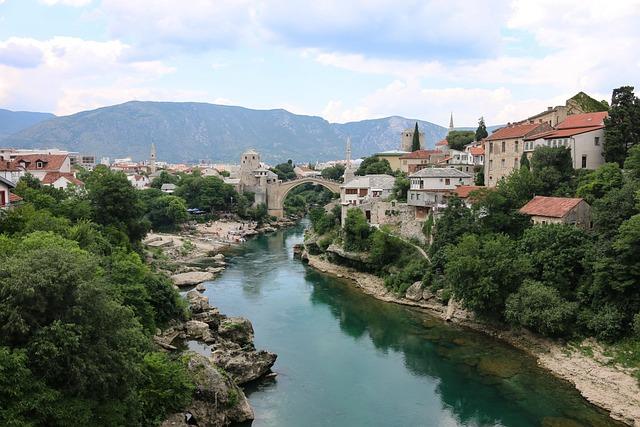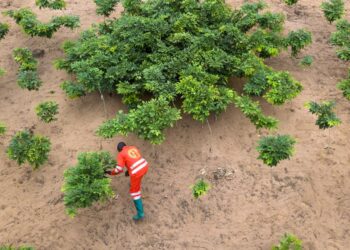In the heart of Southeast Europe, Bosnia and Herzegovina faces a pressing challenge that transcends borders and affects the most vulnerable in society: human trafficking. This pervasive issue not only undermines the safety and dignity of individuals but also poses meaningful threats to social stability and the rule of law. As hundreds of thousands traverse through this region, often seeking refuge or a better life, they become prime targets for traffickers exploiting their desperation. the Organization for Security and Co-operation in europe (OSCE) has taken a proactive stance in combating this grave violation of human rights. By fostering collaboration among government agencies, civil society organizations, and international partners, the OSCE aims to strengthen protective measures, enhance awareness, and ensure that those at risk receive the necessary support. This article delves into the intricate landscape of human trafficking in Bosnia and Herzegovina, exploring the OSCE’s initiatives, success stories, and the ongoing efforts to create a safer environment for all.
Understanding the Landscape of Human Trafficking in Bosnia and Herzegovina
Human trafficking in Bosnia and herzegovina presents a complex and pressing challenge, marked by several interconnected factors. The country’s geographical location as a transit point between Eastern and Western Europe enhances its vulnerability to trafficking networks. The socio-economic climate—characterized by high unemployment rates and persistent poverty—further exacerbates the risk, especially for marginalized populations including women, children, and ethnic minorities. Additionally,the lingering effects of past conflicts have contributed to a culture of instability,where trafficking can thrive due to gaps in law enforcement and social support systems.
The response to this issue involves a multi-faceted approach that combines legal frameworks, victim support services, and community awareness programs. Key components of effective strategies include:
- Strengthening Law Enforcement: Enhancing the capabilities of police and judiciary to combat trafficking networks and enforce existing laws.
- Victim Support Services: Providing extensive rehabilitation and reintegration services for survivors, such as counseling, education, and job training.
- Awareness Campaigns: Educating the public about the signs of trafficking to foster community vigilance and support for victims.

Identifying Vulnerable Populations: The Role of Socioeconomic Factors
In Bosnia and Herzegovina, vulnerable populations are disproportionately affected by trafficking, frequently enough due to a complex interplay of socioeconomic factors.Poverty,lack of education,and limited access to social services create an environment where individuals are more susceptible to exploitation. For many in marginalized communities, the promise of employment or a better standard of living can lead to choices that expose them to traffickers. Factors such as gender discrimination and ethnic minority status further exacerbate vulnerability, wiht women and children frequently enough being the most targeted groups. Understanding these intersections is critical for developing effective prevention strategies.
Furthermore,systemic issues such as high unemployment rates and social instability also contribute to the trafficking crisis. Many individuals, particularly those living in rural areas, experience significant barriers to accessing economic opportunities and financial support, making them targets for criminals who prey on their desperation. A recent analysis highlights the correlation between socioeconomic indicators and trafficking incidents, indicating that regions with higher poverty levels see increased reports of trafficking activities. The following table summarizes some key socioeconomic indicators in relation to trafficking risk:
| Indicator | Risk Level |
|---|---|
| Poverty Rate | High |
| Unemployment Rate | Very High |
| education Access | Limited |
| Social Services Availability | Inadequate |

Strengthening Legal Frameworks: Enhancements Needed for Effective Enforcement
To effectively combat trafficking in Bosnia and Herzegovina, a comprehensive approach to legal frameworks is essential. This includes not only the introduction of robust anti-trafficking laws, but also the refinement of existing legislation to address the unique complexities of trafficking in persons. Key enhancements should focus on:
- Clarifying definitions of trafficking to encompass all forms of exploitation, including labor and sexual exploitation.
- Strengthening victim protection measures to ensure that survivors are treated with dignity and receive necessary support.
- Establishing clear responsibilities for law enforcement agencies, judicial authorities, and social services to facilitate a cohesive response.
- Encouraging collaboration among government bodies, NGOs, and international organizations to enhance resources and knowledge sharing.
Moreover, the effectiveness of enforcement mechanisms hinges on the training and capacity-building of professionals handling trafficking cases. Programs should be implemented to:
- develop specialized training for law enforcement and judiciary personnel about trafficking indicators and victim support.
- Implement transparent monitoring systems to evaluate the enforcement of laws and overall progress in tackling trafficking.
- Promote community awareness campaigns to mobilize public support and reduce stigma associated with trafficking victims.

Building Collaborative Networks: The Importance of Local and International Partnerships
In the ongoing fight against human trafficking in Bosnia and Herzegovina, the establishment of robust collaborative networks is pivotal. By connecting local organizations with international partners,stakeholders can leverage diverse resources and expertise to implement effective strategies. These partnerships foster a comprehensive approach that addresses the complexities of trafficking through a shared understanding of local challenges and international best practices. Key benefits of building these networks include:
- Resource Sharing: Pooling financial, educational, and human resources enhances the capacity of local organizations.
- Knowledge Exchange: Engaging with international entities brings in valuable insights and successful methodologies from various contexts.
- Coordinated Advocacy: A unified voice amplifies awareness and drives policy changes at both local and global levels.
To facilitate these collaborations, it is crucial for stakeholders to establish formal channels for dialog and engagement. Creating a structured framework encourages ongoing dialogue and support, which is essential for sustaining momentum in initiatives aimed at combatting trafficking. The following table outlines some of the prominent organizations involved in these efforts:
| Organization | Type of Partnership | Main Focus areas |
|---|---|---|
| OSCE | International | Policy Reform, capacity Building |
| Local NGOs | Local | Awareness, Victim Support |
| UN Agencies | International | Research, Funding |

Empowering Communities: Prevention Strategies that Make a Difference
Strong community engagement is essential in countering human trafficking, particularly in at-risk populations across Bosnia and Herzegovina. Empowering these communities involves a multifaceted approach that includes educational programs, workshops, and access to resources.Key strategies for prevention can include:
- Raising Awareness: Conducting campaigns to educate citizens about the signs of trafficking and how to report suspicious activities.
- Building Trust: Establishing a rapport between law enforcement and local communities to foster cooperative relationships.
- Support Networks: Creating support groups for vulnerable populations, including women and children, to provide safe spaces and resources for those in need.
Furthermore, collaboration with local organizations is vital for creating tailored initiatives that resonate within the context of Bosnian society. by fostering enduring solutions, communities can become resilient against trafficking schemes. A comprehensive strategy might encompass:
| Strategy | Description |
|---|---|
| Community Training | Equipping community leaders with tools to identify and address trafficking. |
| Youth engagement | Involving youth in advocacy and education efforts to empower them as leaders. |
| Resource Accessibility | Providing easy access to legal and social services for potential victims. |

Supporting Survivors: Best Practices for Rehabilitation and Reintegration Programs
Rehabilitation and reintegration programs for survivors of trafficking are crucial for their recovery and empowerment. Comprehensive support systems should be established to ensure that survivors have access to essential services, including medical care, psychological counseling, and legal assistance. It is indeed vital to create an environment that promotes trust and safety, allowing survivors to share their experiences without fear of stigma or retaliation. The collaboration between government agencies, non-governmental organizations, and community groups will enhance the effectiveness of these programs, fostering a holistic approach that addresses the diverse needs of individuals.
Moreover, tailoring rehabilitation efforts to the specific cultural and socioeconomic context of Bosnia and Herzegovina can significantly influence their success. Best practices include:
- Implementing vocational training and education programs to empower survivors with skills for sustainable employment.
- Offering housing support to provide stable living conditions that promote independence.
- Facilitating community reintegration initiatives that create opportunities for social interaction and support networks.
Furthermore, measuring the impact of these programs through ongoing assessment and feedback mechanisms is essential. By continuously evaluating outcomes, stakeholders can refine strategies, improve service delivery, and ultimately enhance the long-term well-being of survivors.
To conclude
As Bosnia and Herzegovina continues to navigate the complexities of socio-economic challenges and post-conflict recovery, the importance of tackling human trafficking cannot be overstated. The OSCE’s dedicated efforts to protect the most vulnerable populations in the region highlight the necessity of concerted action, collaboration, and comprehensive strategies.By addressing the root causes of trafficking and providing support for survivors, the OSCE is not only working towards justice for individuals but also fostering a safer, more resilient society. The road ahead may be fraught with obstacles, but with continued vigilance and commitment from all stakeholders, Bosnia and Herzegovina can make strides in eradicating this pervasive issue. As the international community watches and supports these initiatives, the hope remains that the most vulnerable will be empowered, protected, and able to build brighter futures free from exploitation.









